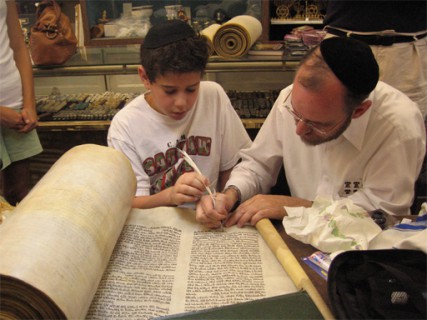
(RNS1-NOV01) In 2008, Ethan Ulanow assists Rabbi Menachem Youlus in completing the final letter of a restored scroll that Ethan and his family bought, then donated to a synagogue in Katrina-ravaged Metairie, La. Youlus was later charged with fraud for saying the scroll (and others) was rescued from the Ukraine during the Holocaust. For use with RNS-TORAH-TALES, transmitted Nov. 1, 2011. Photo courtesy Washington Jewish Week.
METAIRIE, La. (RNS) Until recently, two remarkable stories surrounded the beautiful hand-lettered Torah scroll at Congregation Beth Israel
Story No. 1 was that the scroll was nearly lost in the Ukraine during the Holocaust, then recently rescued and impeccably restored.
Story No. 2 was that it came as a gift from strangers, a Maryland family whose teenage, special-needs son decided that securing a replacement Torah for the Metairie congregation should be his response to Hurricane Katrina.
The first tale turned out to be part of an apparent nationwide hoax. The second, however, remains true.
And Rabbi Uri Topolosky in Metairie and Leslie Ulanow in Maryland say they can live with these facts: the man known as “the Jewish Indiana Jones” who supplied the Metairie scroll faces federal charges for allegedly making up phony, sometimes dramatic, Holocaust rescue tales to attract donations to his Save a Torah Foundation.
The Torah is the center of Jewish life and law, and in the Orthodox tradition the exact record of God’s own words. As a result, the handwritten scrolls containing the first five books of the Bible are any community’s most precious possessions.
Menachem Youlus sold the $20,000 scroll to the Ulanow family so they could pass it on to Beth Israel, a small Orthodox congregation whose seven Torahs were ruined when its synagogue was flooded by Hurricane Katrina.
Youlus said he recovered the Beth Israel Torah from a Ukrainian Christian monastery, where it had been long hidden after its presumed theft from a murdered Jewish community.
Youlus told similar tales about other Torahs, according to federal prosecutors in New York: that he had rescued scrolls from the Bergen-Belsen and Auschwitz death camps; that he had recovered others from hiding places in barns and monasteries.
Prosecutors allege that none of that is true. They said Youlus made up phony rescue stories to attract more than $1.2 million in donations to his Save a Torah charity, from which he embezzled at least $145,000.
In August, they charged Youlus with one count of mail fraud and one count of wire fraud. He has denied the accusations through his lawyer.
Ulanow and Topolosky both say they have been contacted by prosecutors and asked to provide information around their acquisition of the scrolls and the narrative supplied by Youlus.
Each has a right to be dismayed by the developing scandal – but neither is.
According to Ulanow, the family is active in the Jewish community. He and his wife, Lori, keep a Jewish household that seeks to inculcate Ethan, now 16, and Maddie, 18, with the principles of ethical living.
“We believe in tikkun olam,” said Ulanow, using the Hebrew term for Judaism’s ethical imperative to “repair the world.”
When his children were still young, Ulanow took them to homeless shelters. After the 2004 Pacific tsunami, and the 2010 Haiti earthquake, the family discussed how to help and made relief contributions.
After Katrina, Ulanow said the family was having a familiar post-disaster discussion when Ethan, a special-needs student then approaching his bar mitzvah. Ethan asked whether they might do something other than make a donation of money.
About the same time, through their Potomac, Md., congregation, the family learned of the Save a Torah charity, and a light went off for Ethan, his father said.
“My son said if we want to do something Jewishly, I’ll bet some synagogues lost their Torahs and could use a new one.”
Ulanow said Ethan donated all of his bar mitzvah gift money toward the purchase of Youlus’ supposed Ukrainian Torah scroll. The family supplemented Ethan’s contribution to reach the $20,000.
A few months later, in early 2008, the Ulanows flew to New Orleans and presented Beth Israel with their gift, beginning a relationship that still endures.
The Ulanows remain associate members of the congregation. They contributed to the construction of Beth Israel’s new post-Katrina synagogue.
“Ethan and I Facebook occasionally,” the rabbi said. “He’s a great kid. I’ve got his picture on the wall next to my desk.”
And what about the suspect Torah?
Its origin is now entirely uncertain, Topolosky said. “We were told by Save a Torah it was more than 100 years old. Now we don’t know. It’s definitely more than 20 years old, but other than that, we have no information.”
It’s certainly beautiful, Topolosky said, beautifully lettered and free of smudges and other imperfections. And it’s in regular use.
Topolosky said he is not losing sleep over Youlus’ alleged deceit.
“Here was a boy a thousand miles away who felt sorry for our congregation and wanted to help. And he did,” Topolosky said. “The story of that Torah for us is not so much about the Ukraine, but that a boy donated a Torah out of the deepest recesses of his heart. That story hasn’t changed.”
Ethan’s father acknowledges that others hoodwinked by Youlus may be furious, but he’s not one of them.
“I feel like we more than got what we paid for.”
(Bruce Nolan writes for The Times-Picayune in New Orleans.)




